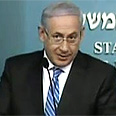For two years, they were impressed by him and applauded him for drawing the lessons from his first term in office, which ended when he was kicked out as result of public revulsion. Ministers, Knesset members and journalists said that he turned into a fox, a seasoned politician who knows how to put out fires even before they erupt; one who knows how to appease everyone in order to maintain the coalition and the government. Benjamin Netanyahu,
a distinguished scholar.
Yet it now appears that all at once, within two weeks or so, everything started to crumble around him. The members of his government and faction are no longer scared of him. They see the fury on the streets, read the headlines, examine the polls and smell the blood. And when politicians reach that point, they start to pull out the knives and talk, either openly or on behalf of “senior sources.” They speak and attack, criticize and disparage.
We can say that the primaries season in Likud was launched this week, and possibly also the next election campaign, whose date is not yet known.
However, heading to general elections is a complex, slow process. The collapse of a government takes time; sometimes it takes many months. However, every prime minister knows that when his colleagues start to issue threats and take jabs at him, slamming his leadership and disparaging his leadership abilities, he would do well to call his donors and start to form a strategic team for the next campaign.
Eli Yishai and Avigdor Lieberman already spotted Netanyahu’s freefall and understood the extent of the anger and revulsion felt by the population group that carries the country on its shoulders; a sector that remained silent for a long time. Yet when the middle class is fed up, the outbreak is sweeping and blinding. The protestors are incensed and are willing to pay a price.
Memories of 1999
Netanyahu is currently at the point where his coalition partners are starting to think about themselves and are counting down the time to the coalition’s demise. Every day where the protest tents, strikes and demonstrations grow, the prime minister’s supportive environment shrinks. Students, doctors, interns, social workers, frustrated parents and young people who no longer see a future or hope for a dignified life in Israel are hitting the streets and demanding a change. They long for other days and demand social justice.
While the security situation is good and Israel’s economic state of affairs is stable, the future does not bode well. The diplomatic process is stuck, the de-legitimization crowd is feasting on the series of nationalistic laws approved by the Knesset, and the Palestinian September is around the corner.
The situation at this time is reminiscent of 1999. Back then too, Netanyahu led Israel to a dead-end, prompting hundreds of thousands of citizens to feel that their country is losing its way and changing before their eyes, for the worse.
Back then, just like these days at the Likud faction meetings, Netanyahu was confident and arrogant. “He looked completely smug,” said a senior Likud member who took part in a recent Knesset session. “It doesn’t appear that he’s bothered.”
And back then too, the protestors who filled the streets eventually made their way to the polling stations, and sent Netanyahu back to the business world.
- Follow Ynetnews on Facebook

Prime Minister Benjamin Netanyahu

Incensed protestors
Photo: Noam Moskovich
מומלצים















